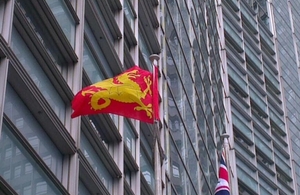The only way is Wessex: Eric Pickles says fly the flag
On 'Wessex Day' the government is encouraging local communities to fly their national and local flags with pride.

Wessex flag flying at DCLG headquarters
The government responded today to recent controversies over the banning of the English flag, by encouraging local communities to fly their national and local flags with pride. He criticised ‘stupid municipal officialdom’ for undermining community relations.
As part of its programme of recognising and celebrating the traditional institutions of England, the government today marks Wessex Day by flying the flag of Wessex – the kingdom which gave birth to the united English nation. Saturday marks the Feast of St Aldhelm, the patron saint of Wessex.
Flags have dragged into political debate in the last week, by Radstock Town Council in Somerset refusing to fly the Cross of St George as it might ‘offend’: the council has now reversed its position after a public outcry, including from Muslim groups. There has also been controversy over a Preston housing association banning a front door from having a smartly painted St George’s cross.
In April, the government formally acknowledged the continuing role of England’s traditional counties in English public life. Previously, many parts of Whitehall and municipal officialdom have shunned these counties, many of which date back over a thousand years of English history. This move complements this government’s abolition of unelected regional government in England, based on European Union’s ‘NUTS1’ administrative boundaries. By contrast, the celebration of Wessex reflects how the government is championing the long-standing, traditional localities of England.
The government has amended the law to make it easier to fly flags without a permit from the council – these new freedoms include flying the Wessex flag.
Eric Pickles, Secretary of State for Communities and Local Government, said:
Recent events remind us that we are stronger as a society when we celebrate the ties that bind us together. In the last week, stupid municipal officialdom has sought to ban the English flag, harming not helping community relations.
I want to send a strong signal – we should fly our flags with pride. Whatever one’s class, colour or creed, let’s have pride in Britain’s local and national identities.
It’s right to celebrate the kingdom that paved the way for a united England: for today, the only way is Wessex.
Derek Pickett, Chairman of the Wessex Society said:
It took a thousand years for the Wyvern to fly free, may it once again inspire those who gaze up to it and bless those who toil beneath it.
Further information
Wessex was the dominant kingdom of Anglo-Saxon England, its name derived from the Old English form for ‘West Saxon’. Wessex kings, such as Alfred the Great, fought off Danish incursions, and by the early 10th century, the Wessex kings had become kings of England.
Wessex dates back to the 6th Century, stretching across southern England. The English author Thomas Hardy adopted Wessex as a setting for many of his novels.
The Wessex flag is being flow alongside the United Kingdom’s Union flag, outside the Department’s for Communities and Local Government in Victoria, London.
The government has amended planning rules to make it easier to fly flags without planning permission – including the Wessex flag. See Flying flags: a plain English guide.
More information about Wessex can be found on the Wessex Society’s website.
Media enquiries
Email newsdesk@communities.gov.uk
Please use this number if you are a journalist wishing to speak to Press Office 0303 444 1209